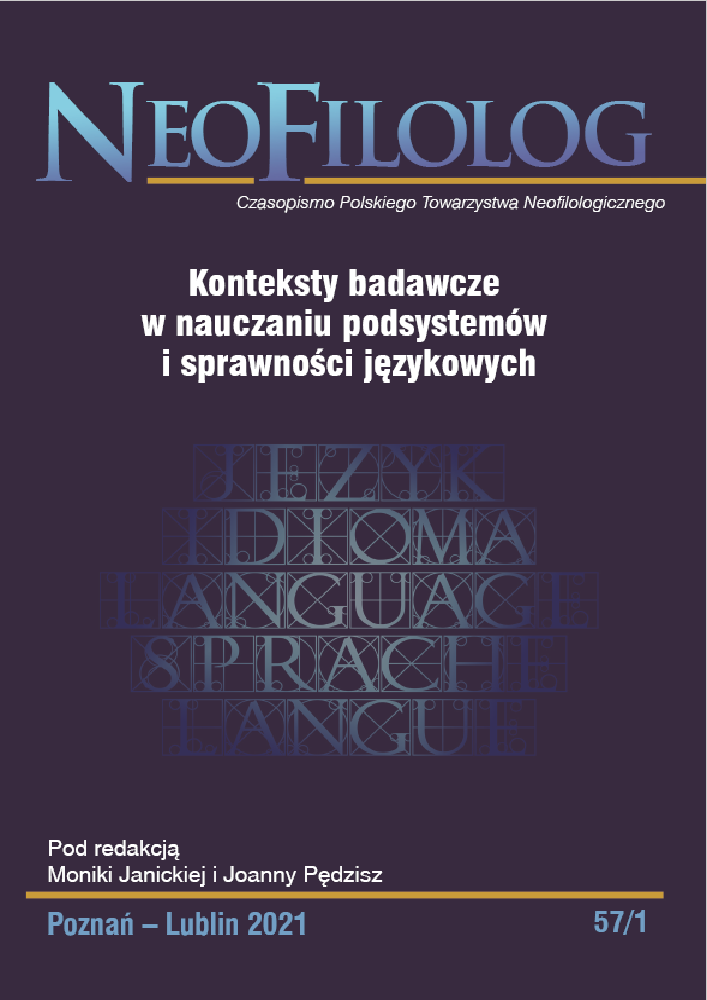Abstract
Correct and effective communication requires the mastery of all language subsystems. In the process of acquiring foreign languages in the educational environment, the development of phonetic competence is often treated as marginal. This is evidenced by the research results quoted in the article. The article is a starting point for a discussion on the usefulness of mother tongue phonetics in shaping phonetic skills in a foreign language. The author's observations and research show that the phonetics of the mother tongue is not only a source of interlingual interference. The knowledge and skills in phonetics acquired in the mother tongue can play the role of a positive transfer in shaping phonetic competence in a foreign language and help in mastering the correct perception and articulation of sounds and prosody.
References
Awramiuk E. (2018), Fonetyka w podręcznikach do nauki języka obcego, (w:) Awramiuk E., Rozumko A. (red.), Z problematyki kształcenia językowego. T. 7. Białystok: Wydawnictwo Uniwersytetu w Białymstoku, s. 167-185. Online: http://hdl.handle.net/11320/9003/ [DW 4.05.2021]
Calbris G. (1971), La prononciation et la correction phonétique, (w:) Reboullet A. (red.), Guide pédagogique pour le professeur de français langue étrangère. Paris: Hachette, s. 60-78.
Champagne-Muzar C., Bourdages J. S., (1998), Le point sur la phonétique. Paris: CLE International.
CECRL (2001), Cadre européen commun de référence pour les langues: apprendre, enseigner, évaluer. Paris: Les Editions Didier.
CECRL (2018), Cadre européen commun de référence pour les langues: apprendre, enseigner, évaluer. Volume complémentaire avec de nouveau descripteurs. Paris: Les Editions Didier. Online: https://rm.coe.int/cecr-volume-complementaire-avec-de-nouveaux-descripteurs/16807875d5/ [DW 4.05.2021]
Cuq J. -P., Gruca I. (2002), Cours de didactique du français langue étrangère et seconde. Grenoble: PUG.
Dłuska M. (1981), Fonetyka polska. Artykulacja głosek polskich. Warszawa-Kraków: PWN.
Europejski system opisu kształcenia językowego: uczenie się, nauczanie, ocenianie (wersja polska). Warszawa: CODN, 2003.
Gajos M. (2010), Podsystemy języka w praktyce glottodydaktycznej. Fonetyka. Łódź: Wydawnictwo Uniwersytetu Łódzkiego.
Gajos M. (red.) (2014), Podsystemy języka w praktyce glottodydaktycznej. „Neofilolog”, nr 43/2.
Gajos M. (red.) (2015), Enseignement/apprentissage des sous-systèmes des langues romanes. Nauczanie/uczenie się podsystemów języków romańskich. „Neofilolog”, nr 44/1.
Gajos M. (2015), Les étudiants polonophones face aux voyelles nasales françaises. „Neofilolog”, nr 44/1, s. 21-37.
Gajos M. (2017), Trening fonacyjno-oddechowo-rozluźniający a dydaktyka fonetyki języka obcego. „Języki Obce w Szkole”, nr 2, s. 8-14.
Gajos M. (2019), Przydatność fonetyki w procesie przyswajania pozostałych podsystemów języka. „Języki Obce w Szkole” nr 3, s. 57-61.
Gajos M. (2020), Fonetyka i ortografia dźwięku języka francuskiego. Od teorii językoznawczych do praktyki glottodydaktycznej. Łódź: Wydawnictwo Uniwersytetu Łódzkiego.
Gniadek S. (1979), Grammaire contrastive franco-polonaise. Warszawa: PWN.
Guimbretière E. (1994), Phonétique et enseignement de l’oral. Paris: Didier-Hatier.
Jaroszewska T. (2009), L’enseignement de la phonétique française aux étudiants de philologie romane en Pologne – quelques propositions de démarche pédagogique, (w:) Paprocka-Piotrowska U., Zając J. (red.), L’enseignement/apprentissage du français langue étrangère. Réfléchir et agir. Lublin: Towarzystwo Naukowe KUL, s. 225-234.
Komorowska H. (2002), Podstawy metodyki nauczania języków obcych. Warszawa: EDE-Poland.
Karaś M., Madejowa M. (1977), Słownik wymowy polskiej. Warszawa: PWN.
Krashen S. D., Terrel T. D. (1983), The natural approach: Language acquisition in the classroom. New York: Pergamon Press.
Lauret B. (2014), Enseigner la prononciation du français: questions et outils. Paris: Hachette.
Piegzik W. (2014), Wpływ umuzykalnienia na przyswajanie podsystemu fonicznego u uczących się języków obcych: wyniki badania. „Neofilolog”, nr 43/2, s. 165-179.
Szałek J. (2015), Principales problemas metodológicos en la enseñanza de los estudios universitarios polacos. „Neofilolog”, nr 44/1, s. 9-20.
License
Copyright (c) 2021 Mieczysław Gajos

This work is licensed under a Creative Commons Attribution-NoDerivatives 4.0 International License.
Authors
Authors of texts accepted for publication in Neofilolog are required to complete, sign and return to the Editorial team’s office the Agreement for granting a royalty-free license to works with a commitment to grant a CC sub-license.
Under the agreement, the authors of the texts published in Neofilolog grant Adam Mickiewicz University in Poznań a non-exclusive, royalty-free license and authorize the use of Attribution-NoDerivatives 4.0 International (CC BY-ND 4.0) Creative Commons sub-license.
The authors retain the right to the free disposal of the work.
Users
Interested Internet users are entitled to use works that have been published in Neofilolog since 2017, under the following conditions:
▪ attribution – obligation to provide, together with the distributed work, information about the authorship, title, source (link to the original work, DOI) and the license itself.
▪ no derivatives – the work must be preserved in its original form. Without the author's consent, it is not possible to distribute the modified work in the form of translations, publications, etc.
Copyrights are reserved for all texts published since 2017.
Miscellaneous
Adam Mickiewicz University in Poznań retains the property right as a whole (layout, graphic form, title, cover design, logo etc.).

